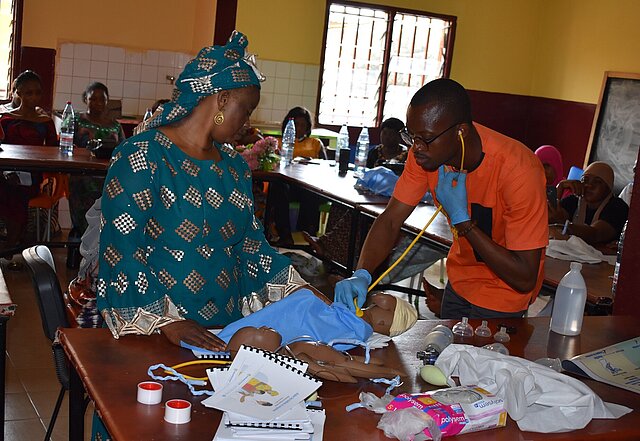When treatment is too expensive
André Kolié from Nzérékoré in Guinea was a very dedicated young nurse who was trained in neonatal resuscitation as part of a DIFÄM project and passed on his knowledge to midwives, nursing staff and doctors from other health facilities. Now the young man is dead. He died far too early after routine medical treatment.
In the very remote region of Nzérékoré in south-eastern Guinea, DIFÄM cooperates with the network of confessional health facilities RECOSAC. The network is coordinated by Dr Emmanuel Goumou. Above all, Goumou complains about the completely underfinanced health system in his country: "The costs for medical services have to be paid mainly by the patients themselves. The covid pandemic has made people even poorer. There is no health insurance. Those who fall ill have to ask family members for money or sell what little they have. Many sick people only come to hospital when their condition is already very serious. Treatment - if it is still possible at all - then often becomes even more expensive and has to be paid for in advance."
Such a situation has now led to the death of André Kolié: When complications arose after an appendectomy, his family did not manage to raise the money for the necessary hospital treatment. They took him to the cheaper traditional healer, although as relatives of a nurse they should have known better. "They can't even be blamed for that. They pay too much money for ill-equipped health services, often poorly trained staff and unavailable medicines. No wonder there is little trust in this system," says Goumou.
Multiple approaches for improvement
He continues: "As a partner of DIFÄM, we try to approach the problems from different angles. We invest in the training of doctors, nurses and midwives and at the same time also work with the traditional healers in the villages so that they are able to recognise emergencies and refer them to the health facilities. We equip health facilities and help villagers to find out how they themselves can do their part, for example by improving hygiene. We also help hospitals to improve the quality of care and link them with the government. As a church health care provider, we make an important contribution to the health of our population, but so far we do not receive any government support for this. For our work, we need not only modern clinic equipment but also computers and the knowledge of how to effectively use the internet and digital communication. For all this, we get support from DIFÄM."
Perseverance is needed
One of the biggest challenges is still to come: payment for health services is to be revolutionised via mobile phones in such a way that people's limited resources can be used optimally so that everyone can get the best possible health care. DIFÄM is also involved in this long-term development.
DIFÄM health officer Ute Papkalla knows that improved care is not possible overnight: "DIFÄM's long-standing partnership with RECOSAC is particularly important in order to strengthen the health system in the Nzérékoré region in the long term and sustainably. Every euro is well-spent, whether for ultrasound equipment, face-to-face and online training, or the establishment of sustainable health financing."

